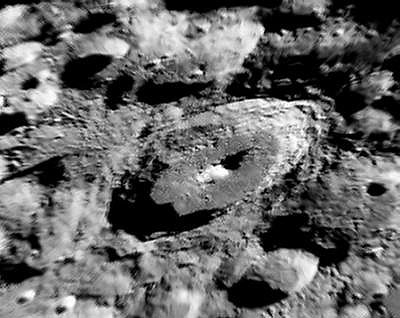June 27, 2004
An Older Tycho
Image Credit: John Sussenbach |
|
An Older Tycho Have you ever set up your telescope when the Moon is about 9 days old and scanning the terminator said, "Must be a great libration, Tycho is pretty far south tonight"? I have, and then I realized that I've been fooled once again by Tycho's look-alike, Moretus. Like the pair Eratosthenes and Copernicus, Moretus is the older and over-shadowed lesser twin of one of the best known craters on the Moon. But Moretus is worth a second look for it is another classic example of a complex lunar crater. Its 114 km diameter rim steps down via one large scarp and a jumble of terraces to a flat floor 3.95 km below the rim crest. John's photo shows parallel banding in the wall - traces of the original terraces. The floor is mostly smooth (impact melt?) and this Lunar Orbiter IV image reveals a narrow rille that seems unusual for impact melt. There is also a large central peak and some low hills, especially to the west. Orbiter images also show subdued secondary craters to the northwest, and a search at full Moon shows that Moretus is invisible - no rays nor rim brightness remain. The lack of rays is consistent with the number of superposed impact craters on Moretus' floor - it is an older crater of Eratosthenian age. Technical Details: Related Links: Yesterday's LPOD: An Older Copernicus Tomorrow's LPOD: LACs and More! |
Author & Editor: |
COMMENTS?
Register, Log in, and join in the comments.




